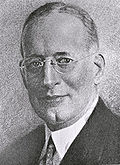| |||||||||||||||||
| |||||||||||||||||
 County results Adams: 40–50% 50–60% 60–70% Schuyler: 40–50% 50–60% | |||||||||||||||||
| |||||||||||||||||
| Elections in Colorado |
|---|
 |
The 1932 United States Senate elections in Colorado took place on November 8, 1932. Incumbent Republican Senator Charles W. Waterman announced that he would not seek re-election to a second term. Attorney Karl C. Schuyler won the Republican nomination to succeed Waterman and faced former Senator Alva B. Adams, the Democratic nominee, in the general election.
Contents
- Democratic primary
- Regular election
- Results
- Special election
- Republican primary
- Regular election 2
- Special election 2
- General election
- Results 3
- References
However, shortly before the primary elections took place, Waterman died in office. Governor Billy Adams appointed Walter Walker, the Chairman of the Colorado Democratic Party, to fill the vacancy. [1] A special election was called for the November 8, 1932, general election to fill the remaining months of Waterman's term. The state Republican Party named Schuyler as its nominee, but Adams declined to be a candidate in the special election, and Walker was named as the nominee.
The ensuing elections produced a split result. Schuyler narrowly won the special election over Walker by about 1,000 votes, and ended up serving for several months in the Senate. However, Adams handily defeated Schuyler for the full term.

